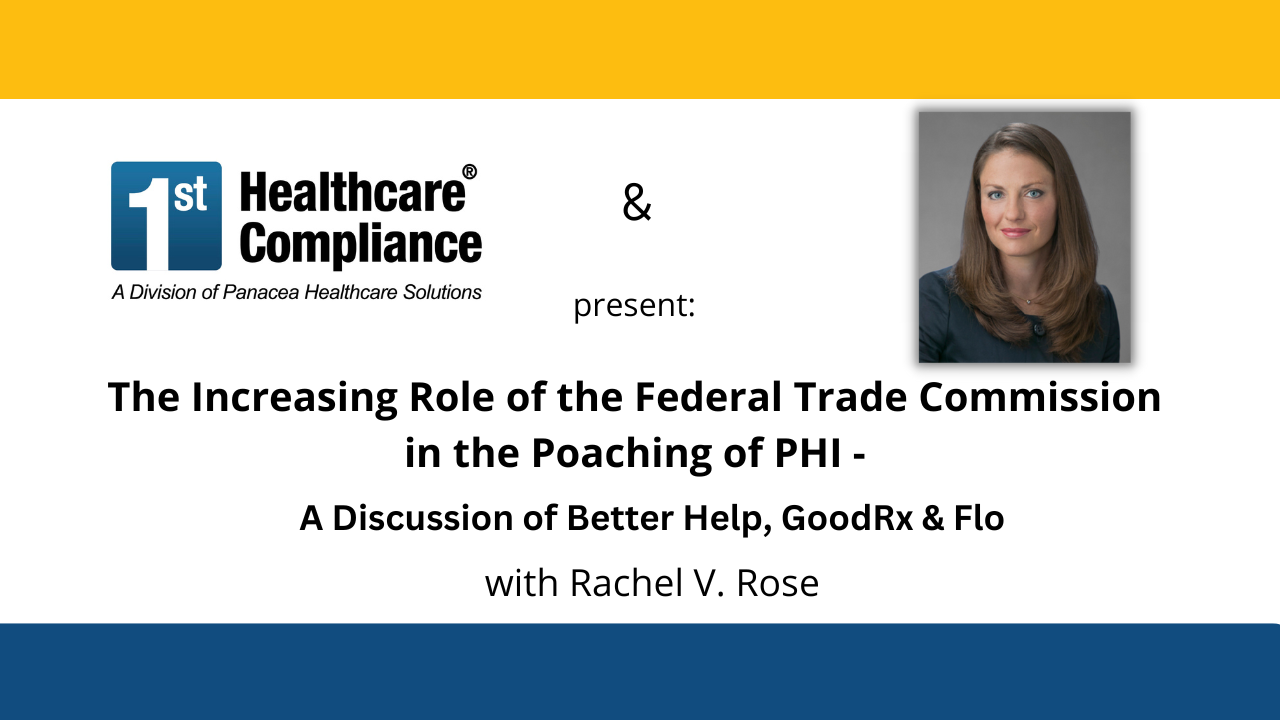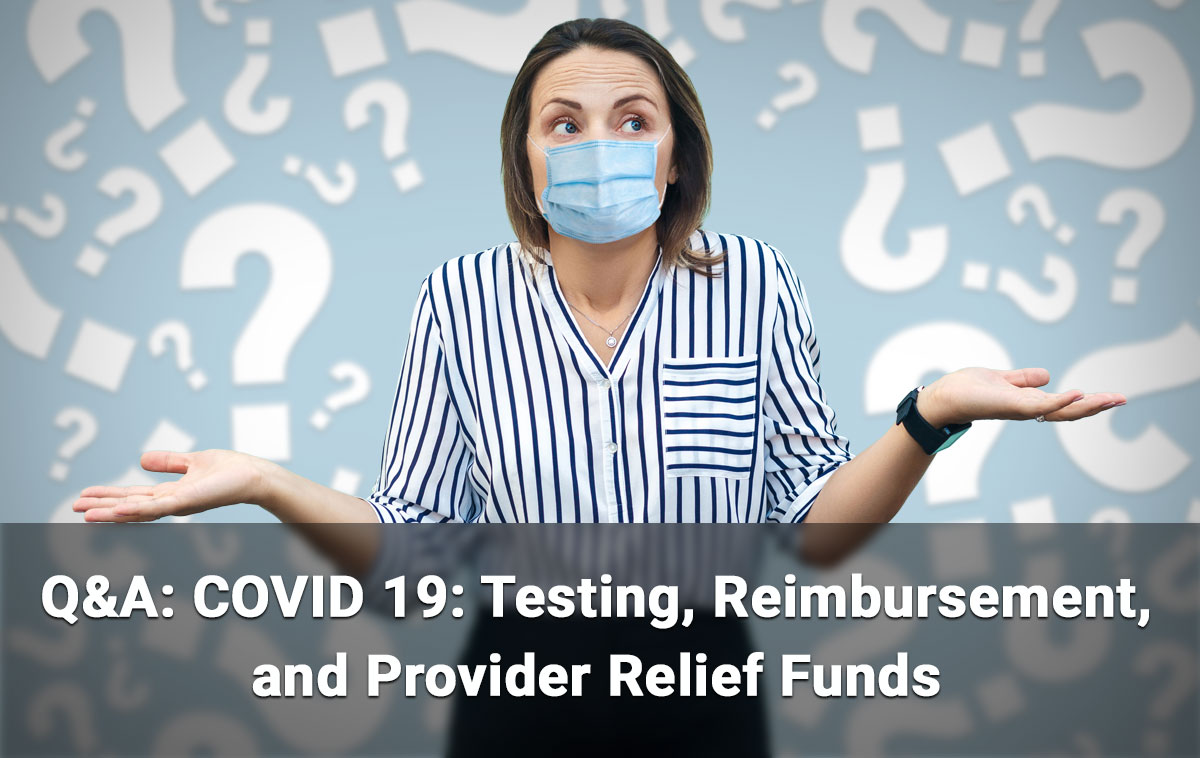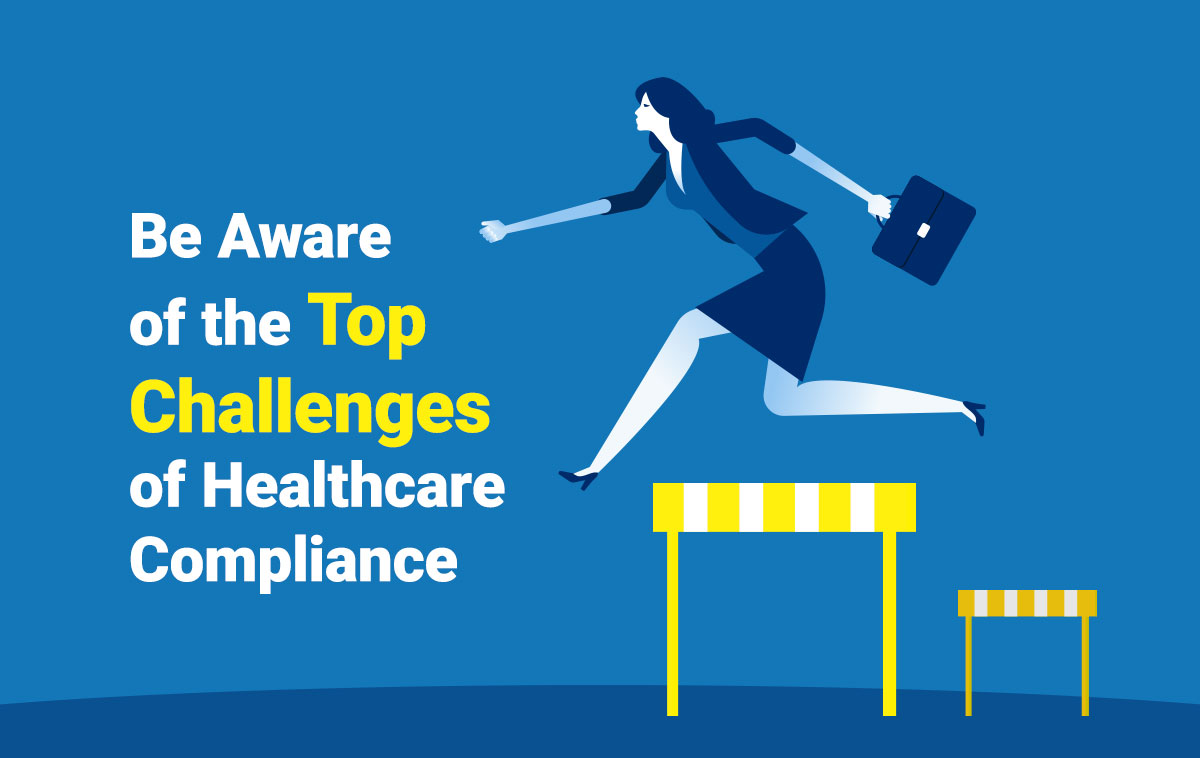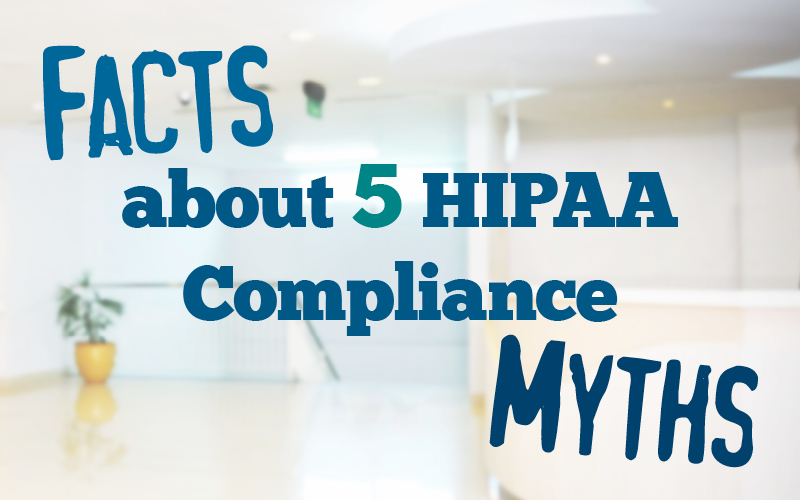How New Legislation Impacts Privacy
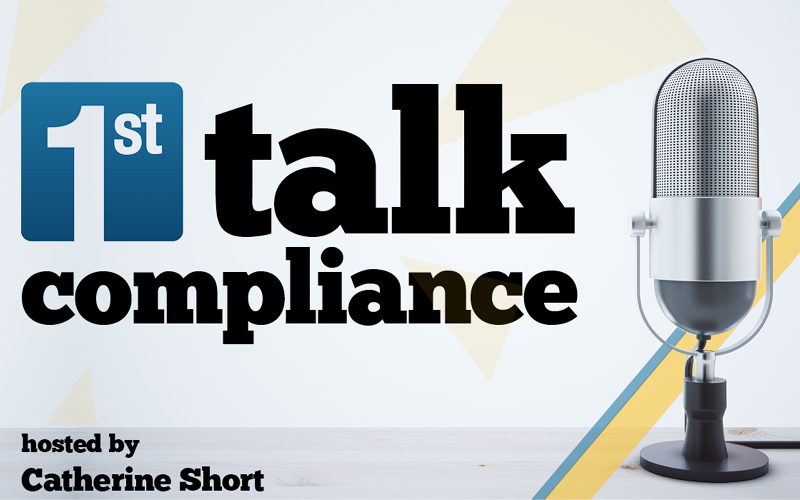
1st Talk Compliance features guest Rachel V. Rose, JD, MBA, principal with Rachel V. Rose – Attorney at Law, P.L.L.C., Houston, TX, on the topic of “How New Legislation Impacts Privacy.” The Dobbs Opinion repealed fifty years of precedent under Roe. The implications of the Opinion extend beyond women’s reproductive rights and impact the privacy rights of all Americans. The purpose of this episode is to explain the key aspects of the Dobbs Opinion related to privacy from both the Majority and the Dissent’s perspective, address the current legislative initiatives, HHS Guidance, and Executive Orders, as well as appreciate the role HIPAA plays in navigating Dobbs.
Subscribe: Amazon Music | Email | RSS | More
Catherine Short: 0:01
Welcome, and let’s 1st Talk Compliance. I’m Catherine Short, Manager of Virtual Education at First Healthcare Compliance. Thanks for tuning in. This show is brought to you by First Healthcare Compliance as part of our commitment to provide high quality complementary educational resources. We help create confidence among compliance professionals throughout the United States. Please show your support by taking a moment to provide a review on Google, Facebook or iTunes. You can also follow us on Instagram, Twitter, and subscribe to our YouTube channel.
On today’s episode, we are speaking with Rachel V. Rose, JD, MBA Principal with Rachel V. Rose Attorney at Law PLLC Houston, Texas on the topic of how new legislation impacts privacy. The Dobbs opinion repealed 50 years of precedent under Roe. The implications of the opinion extend beyond women’s reproductive rights and impact the privacy rights of all Americans. The purpose of this episode is to explain the key aspects of the Dobbs opinion related to privacy from both the majority and the dissents perspective, address the current legislative initiatives, HHS guidance and executive orders as well as appreciate the role HIPAA plays in navigating Dobbs.
Before we begin, I would like to mention at First Healthcare Compliance, we strive to serve as a trusted resource for compliance professionals and every month we celebrate their hard work and dedication with our compliance Super Ninja recognition.For this episode, we’re spotlighting Super Ninja, Robert Connelly, CEO at Pinnacle. Robert says what he enjoys most about working at Pinnacle is the ability to assist patients in obtaining outstanding Ear, Nose and Throat care by our providers. Congratulations, Robert, our team is honored to have the privilege of working with you.
So thank you, Rachel, so much for being here today on First Talk Compliance. It’s always an extreme pleasure, and this is such an important topic.
Rachel V. Rose 2:08
Thank you, Catherine, for having me here today.
Catherine Short 2:11
Okay, so let’s go ahead and get into it. Because this has been a highly charged subject, I know so much information and misinformation has been flying around. If you could help clarify things, and if you could give a high level and brief background to the recent Dobbs opinion and the overturning of Roe and even remind our listeners who the players are here who are Dobbs and Roe, what happened, how did we get here?
Rachel V. Rose 2:39
Absolutely, Catherine. I’m going to start with Roe v. Wade, which was the seminal 1973 case, which provided a constitutional right to an abortion and relied upon the right of privacy. In terms of the follow up case to that, it’s called Planned Parenthood versus Casey and Casey was the governor for the state of Pennsylvania, and the United States Supreme Court opined on Casey in 1992 and rendered that opinion. The slight difference there was related to requiring that a woman be informed of the availability of information relating to having an abortion not having an abortion. From my perspective, as someone who’s taught bioethics for nine years, basically, in that situation, all the physician or the clinic was doing was providing enough information of the pros and cons and the options in order for the potential patient to give informed consent. Now, informed consent is premised on one, the individual having decision making capacity, and two the informed consent. There are typically four prongs to informed consent. One is that the patient understands, two is that the patient can reason, three is that there’s assurances and assimilation that occurs, and lastly, it’s a provision of consent. Having that informed consent is key.
The court held that the informed consent provision, which was set forth in Pennsylvania law was not an undue burden on a woman’s constitutional right as to whether or not to terminate a pregnancy. We fast forward to Dobbs and it’s Dobbs vs. Jackson Women’s Health Organization, and specifically, it was decided on June 24 of 2022. The court held that the Constitution does not confer a right to an abortion that Roe and Casey are overruled, and that the authority to regulate abortion is returned to the people and their elected representatives. Well, let’s be clear on elected representatives, because as we know, we elect individuals to the Federal Government and we elect individuals to the State Government here. Basically, it reverted the ability to regulate abortions back to the States, at least in part. Now, the players here in the Dobbs case were the Jackson Women’s Health Organization, which was an abortion clinic and then the petitioner was Jackson, at issue was the Mississippi law called the Gestational Age Act, which actually provided that except in a medical emergency, or in the case of severe fetal abnormality, a person shall not intentionally or knowingly perform or induce an abortion of unborn human being if the probable gestational age of the unborn human being has been determined to be greater than 15 weeks. So basically, the US Supreme Court affirmed what the Fifth Circuit decided.
Catherine Short 6:37
Just as a quick reminder, because we have listeners of all ages, and different educational background and everything. So if you could remind us who was Roe again,
Rachel V. Rose 6:49
Sure. Roe was an individual and that wasn’t a real name. Sometimes with a certain type of case filing, an individual can use a John Smith or Jane Doe or Roe, whatever it may be. The case actually originated out of Texas and went up all the way to the Supreme Court.
Catherine Short 7:15
So then, if we could continue on, what are now the privacy implications of the latest Dobbs opinion and overturning of Roe?
Rachel V. Rose 7:26
Interestingly, the word privacy doesn’t appear a lot in the Dobbs majority opinion or the dissent. But basically, there historically has been a specific guarantee in the Bill of Rights that creates a zone of privacy and this is what the dissent ordered. Now, the majority held that the right to privacy allegedly stemmed from the 1st, 5th, 9th and 14th amendments. Why is that important? Well, it’s important because this has now been overturned. But the privacy rights that are now an issue relate to HIPAA, for example, because of protected health information. It relates to the law enforcement exceptions in HIPAA which we find at 45 CFR 164.512, E and F primarily, the data the selling and marketing of PHI we find at 45 CFR 164.514 and then we start to get into the encroachment into the fiduciary relationship between a patient and a provider as well.
Under HIPAA Privacy Rule, there is that general non-disclosure requirement with certain exceptions. Again, it’s important that if the law enforcement exception is implicated, that it would be an issue with what is being requested, has the patient been notified? Is the request legally valid in terms of meeting due process? All of those issues can in fact, arise in terms of privacy and as we saw in June of 2021, the Federal Trade Commission actually brought an enforcement action successfully against Flo which is the ovulation and period tracking app for not getting patient consent, and selling or marketing that sensitive data to third party analytical vendors and entities who engage in advertising such as Google and Facebook and other entities such as that. There are a lot of different potential ramifications in terms of privacy.
Catherine Short 10:12
You mentioned HIPAA law enforcement exception. Can you discuss that a little bit more and then suggestions for complying with it?
Rachel V. Rose 10:21
Sure. As I mentioned, there are really two prongs. So the HIPAA law enforcement exception actually is not specific to reproductive health. It applies to all types of PHI. Basically, the fundamental purpose behind the law enforcement exceptions are that the Privacy Rule permits, but does not require covered entities to disclose PHI about an individual, even for law enforcement purposes, pursuant to process and otherwise required by law under certain conditions. If a covered entity such as a hospital may want to respond to a law enforcement request being made through a process, such as a court order, or a warrant, or a subpoena or a summons or an administrative agency, by disclosing only the requested PHI provided that all of the conditions specified in the Privacy Rule for permissible law enforcement disclosures are met. In the absence of a mandate enforceable in a court of law, the privacy rules permission to disclose PHI for law enforcement purposes does not permit a disclosure to law enforcement where a hospital or other health care providers workforce member chose to report an individual’s abortion or other reproductive healthcare. So the bottom line is if a an entity or a person receives a subpoena or another type of legal request, you have to make sure that again, you revert back to the two sections that I mentioned 45 CFR 164.512, E and F, because that sets forth what should be included and what the obligations are of that receiving entity. I always recommend consulting outside counsel before responding especially in today’s environment.
Catherine Short: 12:37
So if you’re just tuning in, you’re listening to 1st Talk Compliance brought to you by First Healthcare Compliance as part of our commitment to provide high quality complimentary educational resources. We help create confidence among compliance professionals throughout the United States. My guest today is Rachel V. Rose, JD MBA Principal with Rachel V. Rose, Attorney at Law PLLC Houston, Texas on the topic of “How New Legislation Impacts Privacy”. Please show your support by taking a few minutes to provide a review of First Healthcare Compliance on Google or Facebook. You can also find us on all other social media.
Oral contraceptives. There’re millions of women, I would say, probably taking these or have taken these. Are there any specific considerations with respect to oral contraceptives and how that fits into privacy? What are your thoughts on that?
Rachel V. Rose 13:33
So because the FDA has approved oral contraceptives for other purposes other than the inhibition of pregnancy, women use it for a variety of different conditions such as premenstrual dysmorphic disorder, such as endometriosis, and acne and amenorrhea to regulate the period. It’s very common in female athletes, for example, or women who are anorexic not to have regular periods. Polycystic ovarian syndrome, which is actually an autoimmune condition. All of those have ramifications not only on a woman’s cycle, but also on her fertility. That is exactly what Title X sought to establish. And that is that the women’s reproductive health be made a priority and that the preservation of reproductive health be available to women.
Catherine Short 14:40
What does that have to do then with Dobbs and the overturning of Roe and privacy? Could you spell that out for us a little bit more?
Rachel V. Rose 14:49
Well, what’s interesting is contraception could be condoms, too, right? So now you’re not only talking about female reproductive health, you’re talking about male reproductive health and as well, so that I find very interesting on that front. The other part is that as we’ve seen with conditions such as lupus and rheumatoid arthritis and cancer, at least 30 states are saying, if a woman is of reproductive age, then certain states are banning those medications. As was asked in a previous presentation, pharmacist or declining to refill them while if a prescription is coming in, it has to be for a purpose that needs medical necessity. In terms of the ramifications for oral contraceptives in particular, certain states are taking a broad brush approach that it’s not only Dobbs doesn’t only relate to abortion, it also relates to women’s reproductive health. Going back to Griswold versus the state of Connecticut, which is a 1965 Supreme Court case, that was something that fit within the zone of privacy, but also was something between a doctor and the patient to decide not the government to mandate. That’s just something that is disconcerting on a lot of fronts.
A lot of people take different medications, for different reasons. For anyone who appreciates FDA law, there actually are certain meds and I’ve read a lot of articles on this, that have a blackbox warning not to get pregnant, because the fetus will be deformed if you get pregnant while on this drug. Well, sometimes the path to hell is paved with good intentions. But the analogy here is that anything can happen. A woman might be on the pill, but she might miss it a day or a condom could break and she could end up being pregnant despite the medication saying you shouldn’t be pregnant on this medication. All of those factors need to be considered. Unfortunately, in some states, the issue of oral contraceptives and other drugs are being looped into this broad brushstroke prohibition on procedural abortion.
Catherine Short 17:22
Are they also including things such as IVF, and also the intrauterine device?
Rachel V. Rose 17:32
You’re raising a lot of good issues and IVF, again, you need to look state by state as to what different states are saying. Interestingly, just in the beginning of August, Georgia passed a law saying that a woman who is pregnant can get certain disability or certain payments for being pregnant and have certain monetary benefits. But what’s interesting on the flip side, is that naturally, a lot of pregnancies end. The other side of that is what if the fetus is very deformed? and what happens to those babies who may then be given up for adoption or abandon or things of that nature? So I think it opens the door to a lot of issues.
IVF, I have read a couple of articles on that, and as we know, depending on the type of IVF, certain states are saying, Oh, well, the life begins when the sperm and the egg are put together. Well, what if you have eight sperm and egg that are then frozen? They are not viable because they’re frozen. So at what point does that occur? I don’t have an answer to that. I think that’s an area of bioethics and healthcare that is going to be one to watch.
Catherine Short 18:59
So continuing on in our discussion, what about privacy related to then raping, incest and perhaps age of patients, etc.
Rachel V. Rose 19:10
That’s a very sensitive and important question, because as many people know, if there’s rape or incest, oftentimes there are criminal law implications as well especially if incest occurs with a minor, a provider, whether it’s an ER nurse or a physician may have a legal obligation to report that to certain types of state agencies. That’s something to absolutely be very conscious of. Now, that’s going to vary from state to state and some states aren’t even covering abortions in the event of rape or incest. I think that the long term health implications could be more significant given and the various state laws.
Catherine Short 20:01
Okay, and then something that you brought up earlier was having to do with Flo, for example. So could you discuss the privacy of apps such as this? And then I started this conversation mentioning about information and then misinformation that people are hearing about. And then perhaps sometimes, like the impact of travel, you’re hearing sometimes like that people are being forbidden for traveling for health reasons. How would government officials even find out about or law enforcement even find out about that? In the first place? How do they know you’re not just going to another state for it to visit your relatives?
Rachel V. Rose 20:41
Well, here’s the thing, as you know, I write a lot of articles, right. If people were to look at my history, whether it was when I was writing a lot during the opioid crisis, or now with this particular situation, I look up a lot of things related to reproductive health, abortion, etc. Does it mean I’m going to get an abortion? No. And that’s where the interstate commerce and the line of cases from the Supreme Court, especially going into the late 60s, the Heart of Atlanta Motel, Inc. v. United States, 379 U.S. 241 springs to mind, where interstate commerce gets us into federal jurisdiction. So if we see too many things, situations start to happen, or too much privacy encroachment, going beyond what is, “reproductive health”, then I think that is going to be an area of case law to absolutely watch. And again, the Senate in June, introduced a bill which is still just in the introduction phase, but it was bipartisan to prevent this type of data collection and tracking, because you don’t know if someone’s going to visit a relative or not or if there’s someone like me, who is writing an article in there googling stuff.
Catherine Short 22:08
You had mentioned earlier also, or we talked a little bit about HIPAA law enforcement exception. Obviously, that can cover quite a few things having to do with privacy and health law. But concerning the topic that we’re talking about, so if there was some kind of law enforcement in this case, who specifically does this type of enforcement in states where where regulation is much higher, or for abortion and things like that? Does police or is there some kind of special force? Or are regular people reporting on each other, like bounty hunters? Or? I mean, these are things you hear about. Could you talk about that a bit?
Rachel V. Rose 22:48
Yeah. So in Texas, they have what’s known as the snitch law. It is basically a bounty. Some states might pass a law saying that there is a requirement to report if someone comes to you, but again, going back to the HHS guidance, which was released the beginning of July, that could be a violation and a breach and could require that HHS be notified. This is an emerging area and it’s one to watch. It’s going to vary from state to state, unless, of course, we have federal law, which gets passed that basically reinstates Roe and Casey and only Congress can do that.
Catherine Short 23:36
So is there a way that Dobbs can be overturned?
Rachel V. Rose 23:40
Yes. As many people appreciate, we have three branches of our federal government that are set forth in the Constitution, we have Congress, we have the executive branch, which is the president and the executive agencies and then we have our judiciary, which is defined in article Three. Article one is Congress, Article Two is the executive branch and article Three is the judiciary. What’s important to note is that our system was set up to have checks and balances. So even though the Supreme Court did overturn Roe, importantly, Congress, if they have enough of the required votes on the House side, and then the Senate side can, in fact, pass a law that would memorialize what was permissible under Roe. Not to say that there couldn’t be another challenge down the line, but that is the only way to do that. That’s why, for example, in those executive orders, what the President and the White House can do is limited
Catherine Short 24:51
Such an interesting subject. I wanted to emphasize again, to our listeners, that this is a privacy issue that we’re that we’re emphasizing here and I didn’t know if you had any other thoughts that you wanted to emphasize to our to our listeners?
Rachel V. Rose 25:05
Catherine, this is an emotional issue regardless of the side but as an employer as a healthcare provider, one needs to step back and divorce oneself emotionally and make sure that for example, if the law enforcement exception under HIPAA is being invoked, that the organization is protecting both themselves and the patient because there could be downstream litigation that could be taken against them as well. That’s one area to consider. Another area is the greater impact on both equal protection of women’s health, not even reproductive health. That is another item that absolutely needs to be considered. As I mentioned, condoms are contraceptives, and typically those are used by men. So it does affect men, and it does affect women. It affects families and women or men really who may be going through different types of medical treatments such as cancer, where they may freeze their sperm or their eggs to make sure that when they’re ready, there is a viable option having undergone very significant treatment that could in fact, alter cells. So those are all factors to consider and approaching things from a privacy standpoint and a clinical standpoint in the provider patient relationship, as well as obligations under laws such as HIPAA, and EMTALA should really help mitigate the emotion and just focus on the patient care and what the obligations are under the law.
Catherine Short 26:54
One other question. As a repercussion from some of this, do you think that possibly there might then be a diminishment of the number of providers for women of reproductive age and women who need just general gynecological care or obstetricians, and what’s your opinion on that?
Rachel V. Rose 27:16
So as we learned earlier, the drugs that are being impacted are not just surgical abortions, there are drugs that are used in the treatment of women’s health. So to say that I’m not going to treat a woman of reproductive age, if you think about it, that is a significant part of the population. That would lead down the road into constitutional violations as well as the potential for equal protection violations as well. So I think that’s something to be honed in on.
Catherine Short 27:56
All right.Well, I wanted to thank you so much. I believe that we’re just about out of time.
Rachel V. Rose 28:02
Catherine, always my pleasure, and I look forward to our next conversation.
Catherine Short 28:10
Me too. Thank you so much and thanks to our audience as well for tuning in today to 1st Talk Compliance. You can learn more about the show on the program’s page on healthcarenowradio.com and then your voice to the conversation on Twitter @1sthcc or #1sttalkcompliance. You can also email me at catherineshort@1sthcc.com. I’m Catherine Short of First Healthcare Compliance. Remember, compliance is the key to achieving peace of mind.

